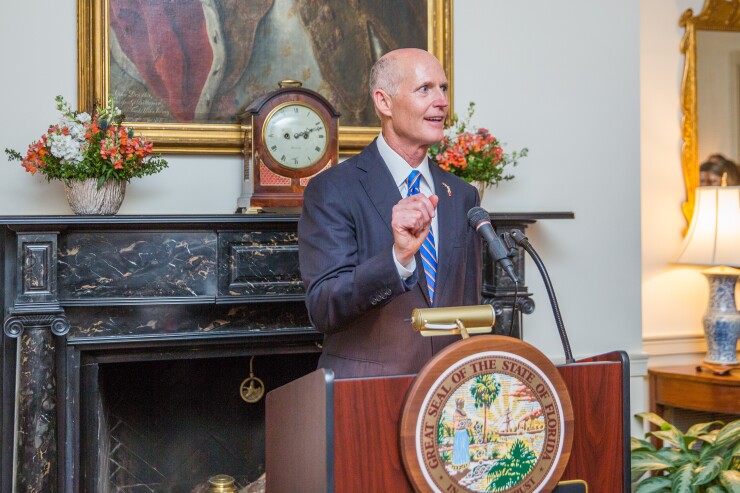BRADENTON, Fla. – Florida Gov. Rick Scott signed the fiscal 2018 budget, then called a special session of the Legislature to rework some numbers after brokering a deal with top lawmakers.
Scott approved the $82.4 billion spending plan Friday, just two days after the 452-page document landed on his desk, and after threatening to veto the entire budget.
Instead, Scott used his line-item veto authority to cut $410 million in legislative projects that “do not provide a great return for Florida families.” The list of canned projects was not immediately released.

Scott said he also vetoed the funding portion of the Florida Educational Finance Program, which had come under fire because lawmakers included only a $24.49 per-pupil increase at a time when state revenues are flourishing.
As he signed the budget Scott issued a proclamation calling the Legislature into a three-day special session starting Wednesday to increase funding for K-12 education and the state’s tourism marketing agency, and to create and fund a new job development program.
“I believe we are on pathway to having a very good special session,” Scott said during a hastily called press conference with Senate President Joe Negron and House Speaker Richard Corcoran at Miami International Airport to discuss the deal the trio negotiated in private.
Using the money that he vetoed from the budget, Scott said he would ask lawmakers to increase per-student funding by $100, a move that would cost a total of $215 million.
The governor is also proposing to create the new $85 million Florida Job Growth Grant Fund “to promote public infrastructure and individual job training, which will encourage more businesses to choose Florida as a destination to grow jobs,” his office said in a press release. No details were provided about who would control the fund.
A third request by Scott will entail increasing the budget for Visit Florida, the state’s tourism agency, to $76 million, the same level as this year.
Lawmakers approved a budget of $25 million for the agency after it became enveloped in controversy over spending and secrecy related to its contracts.
After the two-month regular session that ended May 6, Scott had threatened to veto the budget because lawmakers sharply reduced funding for his priorities, which included Visit Florida and Enterprise Florida, a public-private agency that uses state funds as incentives to companies that move to Florida or expand in the state.
Scott sought $85 million in fiscal 2018 for Enterprise Florida’s incentive program, and lawmakers provided $16 million in the budget for its operations and nothing for incentives.
Corcoran likened the agency to “corporate welfare” because it has operated largely with public funds and lacked transparency.
On Friday, Corcoran said during the press conference with Scott that the Florida Job Growth Grant Fund will operate more broadly than Enterprise Florida has in the past, and that the fund cannot give money to individual companies.
“I think what we’ve done is created a model for the rest of the nation,” he said, adding that the fund will not be used to “pick winners and losers.”
Scott has yet to receive several other budget-related bills, including one that authorizes bonding.
Scott said Friday that he is still reviewing House Bill 7069, a controversial and sweeping $419 million measure that makes numerous changes to K-12 education policy and charter schools.
HB7069 would also direct $140 million to open new charter schools in low-income areas with struggling public schools.





